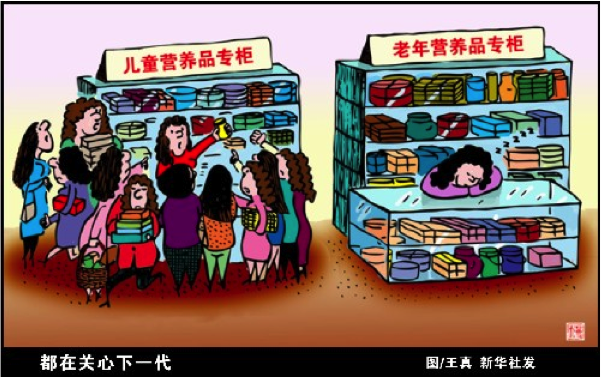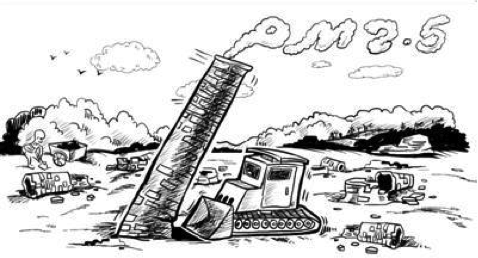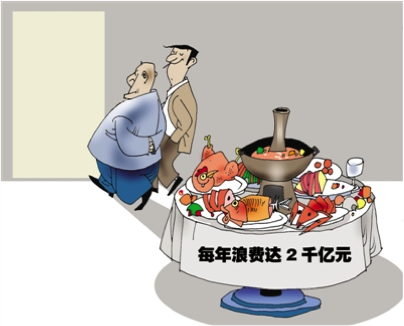C類:兩代關系與家庭話題
Topic 6:愛幼不敬老
此類題目最近的題源是2005年"養老足球賽"及2003年"溫室的的花朵"這兩篇;特提供以下范文一篇,以供參考(此范文選自《考研英語高分寫作100篇》由北京新東方英聯邦部門總監何剛老師及天津新東方學校校長印建坤老師共同編著。范文質量很高,就直接引用,特此申明,并向兩位新東方前輩致謝。)

As can be seen from thepicture, the department in a store which sells nutritive products for childrenis surrounded by crowds of parents, making the salespeople extremely busy. In contrast, the neighboring department that sells similar products for the elderly seems rather deserted by customers. Its saleswoman feels so bored that she can not resist falling asleep.
The picture mirrors a common social phenomenon from a unique angle-people tend to care more for the next generation than the previous one. On the one hand, young couples dote on children, most of whom are the "only children". Parents endeavor to prepare their kids for a bright future by raising them healthily. On the other hand,young couples fail to spend time with their old parents, and some of them are even too mean to provide the old with at least a decent living environment.
I think such a trend is quite abnormal and distressing. Filial duty used to be the most highly prized virtue among the Chinese for over two thousand years. Busy as people are, the duty should not be easily shirked. Supplying our old parents with material and emotional supportsis not only a repayment to them, but can also set a good example to educate theyouth. (214words)
從圖中我們可以看到,一家商店中的兒童營養品專柜前擠滿了父母們,以至于售貨員幾乎要忙不過來了。而隔壁的老年營養品專柜看起來似乎已經被顧客們遺忘了。這個售貨員甚至無聊得睡著了。
這幅圖從一個獨特的視角反映了一個普遍的社會現象,即人們對于下一代的關心超過了上一代。一方面,年輕的夫婦們把大部分的注意力都放在他們的獨生子女身上,讓他們健康地成長并為他們創造美好的未來。另一方面,年輕夫婦們沒能花時間和他們的老父母們在一起,有一些人甚至吝嗇得不肯給父母提供像樣的居住環境。
我認為這是一個非常不正常和令人沮喪的現象。子女孝敬老人的義務一直是中國兩千多年的歷史中最為推崇的美德。現代人即使非常忙,但也不應該把這一義務拋之腦后。為父母們提供物質和精神上的關愛和支持不僅是對他們的回報,也為教育年輕一代樹立了榜樣。
特別提示:建議考生,準備以下"啃老族 boomerang kids"、"就業難 graduates' unemployment"等與青少年相關的話題;兩代溝通話題,也可以關注下。
D類:環境與資源話題
此類題目最近的題源是2011年考研"旅游景區環境破壞";類似題目在2012年12月22日的六級考試中"地球可以滿足人們的需求,卻滿足不了人們的貪婪"關于資源過度開發,也已經考察;屬于熱點話題,應該有所準備。
Topic 7:Air pollution 霧都與空氣污染

The cartoon vividly reveals the phenomenon of air pollution or the declineof air quality. Causes of this issue appears to be complicated and mixed: firstly, vehicle exhaust gases could be one of the most leading causes. With the improvement of economy and people's living standard, more and more urban inhabitants own their private cars. More automobiles will inevitably generate more exhaust gases. Additionally, household appliances widely used in cities also release a great amount of carbon dioxide gases, which further intensifies air pollution. Last but not least, many factories around the cities emit large quantities of untreated and poinsonous gases, which should also be responsible for the decline of air quality.
It is undeniable that air pollution will exert a detrimental impact on many aspects of people's life. For example, many diseases such cough,skin problems and lang cancer are mainly caused by it. Hence, it is about time that we should begin to take some measures to reverse the inexorable decline in the air quality. (167words)
此圖生動地揭示了空氣污染和空氣質量下降的現象。這個問題的原因顯得比較復雜:首先,機動車的尾氣排放是主要原因。隨著經濟的發展和人們生活水平的提高,越來越多的城市居民都擁有了自己的汽車,而更多地汽車勢必帶來大量的尾氣排放。其次,城市里廣泛使用的家用電器排放了大量的二氧化碳,這也進一步加劇了空氣污染。最后,城市周邊的很多的工廠,也每天向空氣中排放大量的未經處理的有毒氣體,這也導致了空氣質量的下降。
無可否認,空氣污染會對人們生活的諸多方面造成有害的影響。比如,類似咳嗽、皮膚病和肺癌等很多疾病就主要是由空氣污染造成的。因此,我們是時候開始采取一些行動來扭轉空氣質量的不可逆轉的下滑了。
Topic 8:Thrift and waste 節約與浪費

Symptoms of waste in our soceity are not difficult to find. Lotsof foods on table which could not be eated at a time are thrown away casually. Besides, new clothes deemed out of fashion are also discarded by people. Last but not least, people without habits of turning off the faucet or power switchin time abound in our life, they waste water and electricity without evenrealizing it. Such careless waste can mostly be attributed to the absence of the consciousness of thrift. People today place a higher value on exploiting resources,while they overlook conserving and economizing resources.
There is an old saying in China,"waste is shameful, thrif noble."Definitely, China has always been a country which celebrates thrift and distastes waste. If this trend is to be left unfettered, it will not only waste financial and material resources,but also damage Chinese traditional virtue or even impair the interests of our future generations. Perhaps, it is about time we began to address this issue.(172 words)
在我們的社會中,浪費的現象并不難發現。滿桌的沒有吃完的食物被人們隨意的扔掉;再者,嶄新的卻被認為跟不上時尚的衣服也被人扔掉了;最后,那些沒有及時關掉水龍頭和電源開關習慣的人在我們生活中大量存在,他們在毫無意識的情況下浪費了水和電。這些漫不經心的浪費大多數可以歸結為節約意識的匱乏。現在的人似乎更重視開發資源,而忽視了保護資源和節約資源。
中國有句老話:"浪費是可恥的,節約是高尚的"。的確,中國自古就是一個崇尚節約,反對浪費的國家。當前這種浪費之風如果得不到有效遏止的話,不僅會浪費寶貴資源,損失財力物力,甚至會破壞中國的傳統美德以及子孫后代的利益。也許,我們是時候想一些辦法解決這個問題了。
編輯推薦:
·2022考研英語復習指導:完型填空常考八大點 (2021-8-11 10:31:58)
·2022考研英語復習指導:各題型備考指導 (2021-8-11 10:28:30)
·2022年考研英語一大綱出來了嗎? (2021-8-11)
·2022考研英語復習指導:利用真題高效復習 (2021-8-9 19:12:29)
·2022考研英語復習指導:如何處理翻譯長難句 (2021-8-9 19:11:51)
·免費真題 ·模考試題


- 1
- 2
- 3
- 4
- 5
- 6
- 7
- 8
- 9
- 10
| · | 2022考研復試聯系導師有哪些注意事 | 04-28 |
| · | 2022考研復試面試常見問題 | 04-28 |
| · | 2022年考研復試面試回答提問方法有 | 04-28 |
| · | 2022考研復試怎么緩解緩解焦慮心態 | 04-27 |
| · | 2022年考研復試的訣竅介紹 | 04-27 |
| · | 2022年考研復試英語如何準備 | 04-26 |
| · | 2022年考研復試英語口語常見句式 | 04-26 |
| · | 2022年考研復試的四個細節 | 04-26 |
| · | 2022考研復試準備:與導師及時交流 | 04-26 |
| · | 2022考研復試面試的綜合技巧 | 04-26 |

實用文檔 | 入黨資料 | 入黨申請書 | 入黨志愿書 | 個人自傳 | 轉正申請書 | 思想匯報 | 個人簡歷 | 簡歷模板 | 簡歷封面 | 工作計劃 | 工作總結 | 自我評測
個性評測 | 社交評測 | 事業評測 | 運勢評測 | 報告 | 實習報告 | 工作總結 | 社會實踐 | 心得體會 | 述職報告 | 調查報告 | 辭職報告
法律文書 | 合同范本 | 演講范文 | 更多>>
英語學習 | 聽力口語 | 閱讀寫作 | 翻譯文化 | 趣味英語 | 學習方法 | 英文經典歌曲 | 每日課堂 | 空中英語 | 少兒英語 | 影視英語 | 英文歌曲 | 更多>>
作文大全 | 作文 | 小學 | 初中 | 高中 | 話題作文 | 考研 | 四六級 趣味作文 | 體裁作文 | 記敘文 | 議論文 說明文 | 應用文 | 讀后感 | 作文素材 | 名言警句
優美段落 | 哲理故事 | 詩詞賞析 | 成語知識 | 技巧 | 寫作指導 | 作文點評 | 佳文賞析 | 寫作基礎 | 話題演練 | 作文教學 | 更多>>


